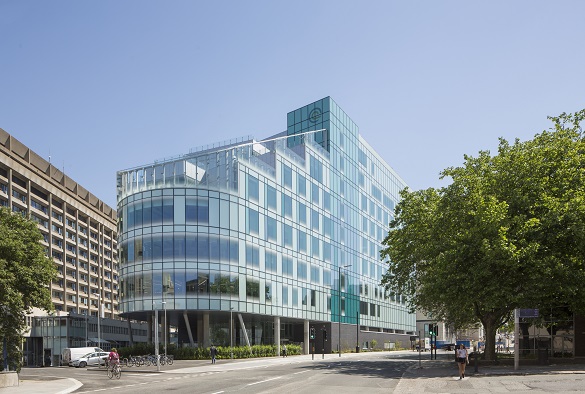
The Clatterbridge Cancer Centre, in conjunction with researchers from the University of Liverpool, has launched four new clinical studies which will investigate the effects of COVID-19 (coronavirus) on people with cancer.
Money raised by The Clatterbridge Cancer Centre NHS Foundation Trust’s charity, The Clatterbridge Cancer Charity, will be used to fund the first phase of the studies which will take up to 18 months to establish results that could help shape the future of cancer care across the country.
The four new studies are being sponsored by The Clatterbridge Cancer Centre NHS Foundation Trust and are in collaboration with experts from the fields of infectious diseases, oncology and other specialties and in conjunction with the University of Liverpool.
Collaborations for the projects have been supported by the Liverpool Health Partners (LHP) Cancer Programme, as part of the Liverpool STOP-COVID scheme, the city’s response to research into COVID-19.
The studies will each recruit patients for data and sample collections to gain critical insights into the impact of COVID-19 on people with cancer.
The first study, being led by Professor Carlo Palmieri, Professor in Translational Oncology at the University of Liverpool and Consultant in Medical Oncology at The Clatterbridge Cancer Centre, and Dr Lance Turtle, Senior Clinical Lecturer at the University of Liverpool and Consultant in Infectious Diseases, is a collaboration with the ISARIC Coronavirus Clinical Characterisation Consortium (ISARIC4C) and investigators at the University of Liverpool, University of Edinburgh and Imperial College London.
This study will describe COVID-19 infection and mortality rates in people with different types of cancer, as well as those receiving various cancer treatments, by collecting and analysing data and linked samples from patients within the national CCP-UK (Clinical Characterisation Protocol) study. ECMC Liverpool (Experimental Cancer Medicine Centre) has been key in supporting CCP-UK.
With over 5,000 patients with both confirmed cancer and COVID-19 diagnoses already enrolled for this study, it will be the largest and most detailed study in the world.
Professor Palmieri, said: “Using anonymised data from patients, our aim is to look ahead to see whether certain cancer types or treatments have different outcomes in relation to COVID-19. We predict our findings will inform future clinical decisions around cancer treatment and the level of risk from SARS-CoV-2, the strain of coronavirus that causes COVID-19, to individual patients.”
The second study, Dis-CoV-er, is a study proposal developed by Professor Nagesh Kalakonda, Reader and Honorary Consultant, Molecular and Clinical Cancer Medicine, University of Liverpool, and Clinical Director for Research and Innovation at The Clatterbridge Cancer Centre. It aims to recruit patients from four cancer centres across the country to gain a better understanding of the true impact of SARS-CoV-2 on the cancer community to help formulate national guidance in the future. Professor Kalakonda said: “The study aims to understand viral exposure and handling by patients with different cancers and treatment histories for risk-stratification and future guidance as they emerge from shielding.”
Professor Andy Pettitt, Professor of Experimental Medicine at the University of Liverpool and Honorary Consultant Haemato-Oncologist at The Clatterbridge Cancer Centre, is leading a study which is focused on patients with certain types of leukaemia and lymphoma that affect the immune system. The study will use information from national data registries to understand the effects of SARS-CoV-2 on patients with these conditions. The aim is to understand which patients are most at risk of developing severe COVID-19 and use the information to inform on public health policies. The study will also investigate how the care of patients living with these conditions has changed during the pandemic and what the long-term consequences might be.
The study was developed as collaboration between The Clatterbridge Cancer Centre NHS Foundation Trust and health data scientists at the Universities of Liverpool and Bangor.
The final project, led by Dr Anna Olsson-Brown, Faculty of Health and Life Sciences, University of Liverpool, and Clinical Research Fellow and Specialist Medical Oncology Registrar at The Clatterbridge Cancer Centre, takes advantage of an established mobile app for cancer patients collect data regarding symptoms, severity and outcomes from COVID-19 in patients receiving immunotherapy treatment. Dr Olsson-Brown said: “What’s unique about this study is that it is patient-directed and gives them the choice of how to record their symptoms with an easy-to-use app. I’m absolutely delighted to have received the funding for this study which I hope will be a step forward in translational medicine.”
The commencement of the studies coincides with the opening of the new Clatterbridge Cancer Centre – Liverpool last month (27th June 2020). The new building, Liverpool’s first dedicated cancer hospital, will play a vital role in the second phase of the NHS response to coronavirus by providing dedicated capacity for cancer care and supporting regional and national efforts to mitigate the impact of the pandemic on people with cancer.
Clatterbridge Cancer Centre – Liverpool’s close proximity to the University of Liverpool will support its plan to facilitate more clinical trials, like the four COVID-19 studies, and will attract academics from around the world interested in investigating new ways of treating cancer.
Of the funding for the studies, Katrina Bury, Head of Charity for The Clatterbridge Cancer Charity, said: “Thanks to the generosity of our donors and the hard work of our team, The Clatterbridge Cancer Charity is able to fund these four clinical studies to help oncology teams across the country to better understand the effects of coronavirus on cancer patients.
“With so many unanswered questions regarding the pandemic and how it has affected cancer patients, their families and carers, it’s even more important that we have public support in fundraising so we can continue to fund vital research to help provide answers and ultimately, even better care for people with cancer.”